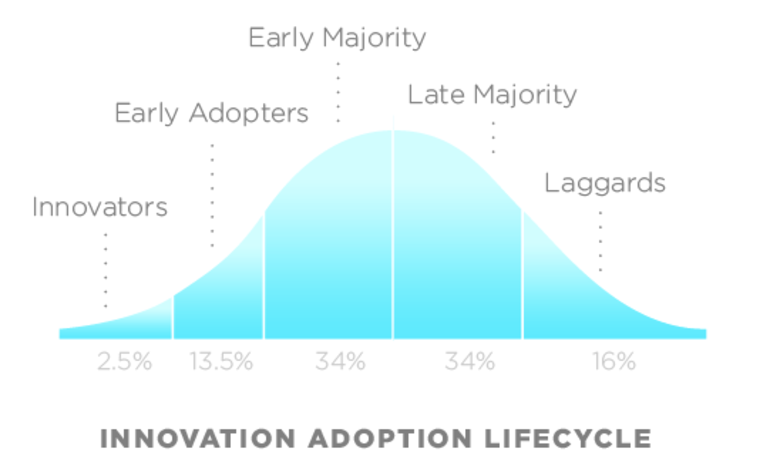As a consumer I have never been an early adopter.
Don’t get me wrong, I love gadgets and technology; I read a number of tech blogs and news sites and have even been known to get a tad overexcited at the release of a new bit of kit or software, but unfortunately due to time, money, family and work (not to mention the fear of backing the wrong horse – I remember Betamax, almost buying a LaserDisc and still have a Sony MiniDisc player gathering dust in my man-cave) I rarely get my hands on them.
This is probably just as well. For all my enthusiasm, I lack the patience, aptitude and skill that being an early adopter of innovative technology requires. Whilst I can embrace change, I’m more comfortable with the familiar – something I know how to work or can pick up swiftly with little effort. As an early adopter you must be prepared to put up with flaws, failures, set-backs and bugs as your new product goes through its growing pains, with you essentially as the guinea pig. Consumers are often willing to put up with these issues in favour of being one of the first to get the coolest new toy or embrace the newest tech, but in business these issues tend to be magnified.
That’s not to say that there are no benefits to being an early adopter. Indeed, if you go in to it with your eyes wide open you can make great gains. Due to the fact that more and more ‘new’ technology products are being released in beta mode, many early adopters get the chance to play a collaborative role, influencing the development and direction of the product. For a large enough business or a key partner this gives them the opportunity to ensure that the product is tailored to their needs, and additionally, as an early adopter you gain valuable insight and a working knowledge of the technology before your competitors, giving you the advantage as that product or software grows and bears fruit.
As a business, to take advantage of the potential benefits of early adoption you need to be agile enough to move swiftly, identify gains and benefits and take advantage of them. More often than not though, businesses don’t often have the right model to exploit these benefits quickly enough, or the luxury to deal with the risks and drawbacks that are associated with early adoption. Companies often can’t afford to put up with the reliability issues, bugs and flaws that are nearly always a factor in innovative technology. Downtime, support costs and uncertainty over product features all play a part, contributing to early adoption being a risky proposition for most companies.
Sometimes the benefits will outweigh the risks but for companies adopting early, those risks have to be monitored very carefully. In addition to the reliability issues, there’s often a higher price tag associated with early adoption, not to mention the risks I’ve been stung by in the past – being swept up in the hype of the ‘new’, investing in the technology or product only to find out that you should have gone with an alternative and have been left with a Betamax, or worse still, a Sinclair C5 (the horror!).
As a consumer, we are in a much better position to take that risk, to make that jump into the unknown and reap the benefits and kudos that can come with early adoption, but for businesses it’s more often than not prudent to hang back, wait until the dust has settled, the battles won and the bugs are ironed out before signing up. Just because it’s not the latest and greatest, doesn’t mean it won’t do the job and for larger organisations reliability and familiarity are strong commodities.
I still want my LaserDisc though…
Image source: Wikimedia Commons
